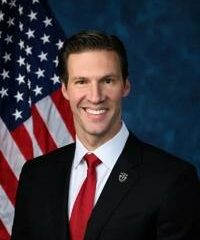Kaiser Health News
GOP’s Tim Sheehy Revives Discredited Abortion Claims in Pivotal Senate Race
Matt Volz
Tue, 09 Jul 2024 09:00:00 +0000
“Elective abortions up to and including the moment of birth. Healthy, 9-month-year-old baby killed at the moment of birth. That’s what Jon Tester and the Democrats have voted for.”
Tim Sheehy, Montana GOP candidate for U.S. Senate, said in a June 8 debate
Tim Sheehy, the Republican candidate seeking to unseat Democratic Sen. Jon Tester of Montana and give U.S. Senate control to the GOP, is campaigning on what he calls Tester’s and Democrats’ “extreme” position on abortion.
In a televised debate June 8, Sheehy accused Tester and Democrats of voting for “elective abortions up to and including the moment of birth.” That statement prompted Tester to respond: “To say we’re killing babies at 40 weeks is total BS.”
Sheehy has made this accusation on his campaign website, which says, “Jon Tester supports elective abortion on demand up until the moment of birth. Think about that again: Jon Tester supports aborting a healthy, full-term baby the day before it’s due. That is the extreme position here.” Similar statements have been made in the campaign’s social media posts.
Painting the Democratic candidate with, in Sheehy’s words, an “extreme” position on abortion is a familiar conservative campaign strategy and campaign talking point this election cycle. But how does it hold up?
Some Recent History
Asked for evidence to support Sheehy’s accusations, Sheehy’s campaign spokesperson, Katie Martin, said the Republican candidate was referring to Tester’s vote for the Women’s Health Protection Act, which failed to pass the Senate in 2022. She cited the bill’s provisions that said health providers and patients would have the right to perform and receive abortion services without certain limitations or requirements impeding access.
Anti-abortion advocates say the measure, which has been reintroduced in the current Congress, would create a loophole eliminating any limits to aborting a fetus later in pregnancy. And, rather than define when a fetus is viable during pregnancy, the bill would leave the question of viability to the health provider, who is financially motivated to perform abortions, according to Susan B. Anthony Pro-Life America, a nonprofit group supporting anti-abortion candidates, including Sheehy.
“It would impose no-limits abortion on demand in all 50 states at any point in pregnancy,” said Marjorie Dannenfelser, president of SBA Pro-Life America.
In 2022, the legislation failed two votes in the Senate before the U.S. Supreme Court’s Dobbs v. Jackson Women’s Health Organization decision removed federal protections for abortion access and left the issue to the states to decide. Tester voted for the measure both times, but the bill failed to advance after votes of 46-48 and 49-51.
Alina Salganicoff, a KFF senior vice president and director of the nonprofit’s Women’s Health Policy Program, said nothing in the Women’s Health Protection Act supports an abortion up to the moment of birth. Rather, the legislation would allow a health provider to perform abortions without obstacles such as waiting periods, tests deemed medically unnecessary, unnecessary in-person visits, or other restrictions imposed by states.
The bill would explicitly allow an abortion after a fetus is viable when, according to the legislation, “in the good-faith medical judgment of the treating health care provider, continuation of the pregnancy would pose a risk to the pregnant patient’s life or health.”
“This is not abortion on demand until the moment of birth,” Salganicoff said. “Even if politicians and anti-abortion activists make this claim, there are no clinicians that provide ‘abortions’ moments before birth.”
Besides the Women’s Health Protection Act, the Sheehy campaign cited Tester’s opposition to “born-alive” legislation meant to protect babies who survive botched abortions.
“At what week does he think it’s inappropriate for medical providers to perform an abortion?” Martin said of Tester. “That would clear up his stance on the issue. Based on his voting record, it suggests he does, in fact, support abortion on demand up until the moment of birth.”
In 2002, Congress passed a “born-alive” law that gave legal protections to infants who survive abortions. A stalled 2022 bill sought to expand that law to add criminal penalties to health professionals who do not take steps to preserve the life of any child born. Montana voters rejected a similar ballot question in 2022.
Tester was elected to the Senate four years after the first bill passed and a vote was not taken on the 2022 measure.
Looking at the Data
Instances of fetuses surviving abortions are rare. So are abortions performed later in pregnancy: Just 1% of all abortions in the U.S. happen at or after 21 weeks of gestation. (The percentage of abortions that occur when the fetus is presumed to be viable, 24 weeks or later, is presumably lower, but the Centers for Disease Control and Prevention does not break out abortion rates for that period.)
An analysis by SBA Pro-Life America’s research arm, the Charlotte Lozier Institute, concluded that 6% of abortions performed in 2020, or an estimated 55,800 abortions, happened at or after 15 weeks of pregnancy.
“Most late-term abortions are elective, performed on healthy women with healthy babies for the same reasons given for first-trimester abortions,” Dannenfelser said.
SBA Pro-Life cites abortions at 15 weeks and later because that is the stage of development at which a fetus can feel pain, according to the group. That is the same rationale behind Republican Sen. Lindsay Graham’s 15-week abortion ban legislation introduced in 2022.
But the American College of Obstetricians and Gynecologists says “the science conclusively establishes” that a fetus does not have the capacity to feel pain until 24 or 25 weeks.
“Every medical organization that has examined this issue and peer-reviewed studies on the matter have consistently reached the conclusion that abortion before this point does not result in the perception of pain in a fetus,” according to the OB-GYN medical group.
Katrina Kimport, a professor in the University of California-San Francisco’s Department of Obstetrics, Gynecology & Reproductive Sciences, said “born-alive” laws are trying to regulate something that doesn’t happen.
Kimport, whose research involved interviewing 30 people in 2018 who had abortions after 24 weeks of pregnancy, and 10 more from 2021 to 2022, also criticized Sheehy’s use of “elective abortion.” In her view, that terminology reflects a political colloquialism that’s come to mean an abortion that is optional. That’s different from the medical definition, she said, in which an elective procedure is one that may be necessary but is not an emergency and can be scheduled for a particular date, such as knee surgery.
Women have abortions later in pregnancy either because they find out new information or because of economic or political barriers, Kimport said.
“I have never spoken to somebody whose abortion decision was not informed by deep thought and consideration,” she said.
Trying to Change the Debate
Mary Ziegler is a University of California-Davis law professor who specializes in the law, history, and politics of reproduction, health care, and conservatism. She said Sheehy’s argument reprises a Republican talking point that abortion opponents have made for decades.
Similar arguments are being heard nationwide as 10 states consider ballot measures to constitutionally protect abortion this election cycle.
Republicans such as Sheehy are accusing Democrats of being extreme on abortion partly to steer the discussion away from their own uncertain position, Ziegler said. The anti-abortion bloc is a key part of the GOP base, but since the Dobbs ruling, voters in seven states, including Montana, have added or upheld abortion rights in elections.
“They can’t really disavow what pro-life groups want as extreme because many of their base voters would be horrified by that,” Ziegler said. “But they can’t embrace it because then many swing voters would be horrified by that.”
Kimport said Sheehy’s statement “reveals a blatant misunderstanding of pregnancy care.”
“What people don’t understand about third-trimester abortions is that there aren’t very many, but for the people who do need abortions later in pregnancy, the circumstances are often desperate and intense,” she said. “And these are the people who are being maligned in these political conversations.”
Our Ruling
Sheehy’s description of Tester’s “extreme” position that would allow abortion “up until the moment of birth” simply doesn’t hold up.
These statements are rooted in Tester’s support for the Women’s Health Protection Act. That bill, however, doesn’t open the door to abortion on demand later in pregnancy. Instead, it allows for the role of medical judgment. In addition, CDC data indicates that late-term pregnancies are rare. Also, the term “elective abortion” is a political rather than medical phrasing.
We rate this claim False.
sources:
NBC Montana, “WATCH: Incumbent U.S. Senator Tester debates challenger Tim Sheehy,” July 9, 2024
X social platform, post by @SheehyforMT, June 9, 2024
Tim Sheehy’s U.S. Senate campaign website, accessed June 9, 2024
Email interview with Katie Martin, Tim Sheehy’s spokesperson, June 11, 2024
Susan B. Anthony Pro-Life America, “SBA Pro-Life America’s Candidate Fund Endorses Tim Sheehy for U.S. Senate,” Jan. 30, 2024
Marjorie Dannenfelser, president of SBA Pro-Life America, in a statement, June 26, 2024
Email interview with Alina Salganicoff, KFF senior vice president and director of the nonprofit’s Women’s Health Policy Program, June 12, 2024
Phone interview with Katrina Kimport, University of California-San Francisco professor, June 12, 2024
Phone interview with Mary Ziegler, University of California-San Diego professor, June 12, 2024
Email interview with Rachel Kingery, American College of Obstetricians and Gynecologists spokesperson, June 12, 2024
KFF, “Status of Abortion-Related State Constitutional Amendment Measures for the 2024 Election,” updated June 28, 2024
KFF, ”Abortions Later in Pregnancy in a Post-Dobbs Era,” Feb. 21, 2024
Julie Rovner, KFF Health News, “Abortion ‘Until the Day of Birth’ Is Almost Never a Thing,” Nov. 15, 2023
American College of Obstetricians and Gynecologists, “ACOG Guide to Language and Abortion,” accessed June 11, 2024
American College of Obstetricians and Gynecologists, “Facts Are Important: Understanding and Navigating Viability,” accessed June 11, 2024
American College of Obstetricians and Gynecologists, “Facts Are Important: Gestational Development and Capacity for Pain,” accessed June 11, 2024
Charlotte Lozier Institute, Fact Sheet: “Abortions at 15 Weeks in the United States,” updated Jan. 12, 2023
PolitiFact, “Ron DeSantis’ False Claim That Some States Allow ‘Post-Birth Abortions. None Do,” July 21, 2023
Women’s Health Protection Act of 2021, accessed June 11, 2024
Women’s Health Protection Act of 2022, accessed June 11, 2024
Women’s Health Protection Act of 2023, accessed July 2, 2024
Born-Alive Infants Protection Act of 2002, accessed June 11, 2024
Born-Alive Abortion Survivors Act of 2022, accessed June 11, 2024
Montana Free Press, “How Montana’s LR-131 ‘Born Alive’ Referendum Failed,” Nov. 15, 2022
Ballotpedia, “History of Abortion Ballot Measures,” accessed June 13, 2024
——————————
By: Matt Volz
Title: GOP’s Tim Sheehy Revives Discredited Abortion Claims in Pivotal Senate Race
Sourced From: kffhealthnews.org/news/article/fact-check-senate-race-montana-tim-sheehy-revives-discredited-elective-abortion-claims/
Published Date: Tue, 09 Jul 2024 09:00:00 +0000
Kaiser Health News
US Judge Names Receiver To Take Over California Prisons’ Mental Health Program
SACRAMENTO, Calif. — A judge has initiated a federal court takeover of California’s troubled prison mental health system by naming the former head of the Federal Bureau of Prisons to serve as receiver, giving her four months to craft a plan to provide adequate care for tens of thousands of prisoners with serious mental illness.
Senior U.S. District Judge Kimberly Mueller issued her order March 19, identifying Colette Peters as the nominated receiver. Peters, who was Oregon’s first female corrections director and known as a reformer, ran the scandal-plagued federal prison system for 30 months until President Donald Trump took office in January. During her tenure, she closed a women’s prison in Dublin, east of Oakland, that had become known as the “rape club.”
Michael Bien, who represents prisoners with mental illness in the long-running prison lawsuit, said Peters is a good choice. Bien said Peters’ time in Oregon and Washington, D.C., showed that she “kind of buys into the fact that there are things we can do better in the American system.”
“We took strong objection to many things that happened under her tenure at the BOP, but I do think that this is a different job and she’s capable of doing it,” said Bien, whose firm also represents women who were housed at the shuttered federal women’s prison.
California corrections officials called Peters “highly qualified” in a statement, while Gov. Gavin Newsom’s office did not immediately comment. Mueller gave the parties until March 28 to show cause why Peters should not be appointed.
Peters is not talking to the media at this time, Bien said. The judge said Peters is to be paid $400,000 a year, prorated for the four-month period.
About 34,000 people incarcerated in California prisons have been diagnosed with serious mental illnesses, representing more than a third of California’s prison population, who face harm because of the state’s noncompliance, Mueller said.
Appointing a receiver is a rare step taken when federal judges feel they have exhausted other options. A receiver took control of Alabama’s correctional system in 1976, and they have otherwise been used to govern prisons and jails only about a dozen times, mostly to combat poor conditions caused by overcrowding. Attorneys representing inmates in Arizona have asked a judge to take over prison health care there.
Mueller’s appointment of a receiver comes nearly 20 years after a different federal judge seized control of California’s prison medical system and installed a receiver, currently J. Clark Kelso, with broad powers to hire, fire, and spend the state’s money.
California officials initially said in August that they would not oppose a receivership for the mental health program provided that the receiver was also Kelso, saying then that federal control “has successfully transformed medical care” in California prisons. But Kelso withdrew from consideration in September, as did two subsequent candidates. Kelso said he could not act “zealously and with fidelity as receiver in both cases.”
Both cases have been running for so long that they are now overseen by a second generation of judges. The original federal judges, in a legal battle that reached the U.S. Supreme Court, more than a decade ago forced California to significantly reduce prison crowding in a bid to improve medical and mental health care for incarcerated people.
State officials in court filings defended their improvements over the decades. Prisoners’ attorneys countered that treatment remains poor, as evidenced in part by the system’s record-high suicide rate, topping 31 suicides per 100,000 prisoners, nearly double that in federal prisons.
“More than a quarter of the 30 class-members who died by suicide in 2023 received inadequate care because of understaffing,” prisoners’ attorneys wrote in January, citing the prison system’s own analysis. One prisoner did not receive mental health appointments for seven months “before he hanged himself with a bedsheet.”
They argued that the November passage of a ballot measure increasing criminal penalties for some drug and theft crimes is likely to increase the prison population and worsen staffing shortages.
California officials argued in January that Mueller isn’t legally justified in appointing a receiver because “progress has been slow at times but it has not stalled.”
Mueller has countered that she had no choice but to appoint an outside professional to run the prisons’ mental health program, given officials’ intransigence even after she held top officials in contempt of court and levied fines topping $110 million in June. Those extreme actions, she said, only triggered more delays.
The 9th U.S. Circuit Court of Appeals on March 19 upheld Mueller’s contempt ruling but said she didn’t sufficiently justify calculating the fines by doubling the state’s monthly salary savings from understaffing prisons. It upheld the fines to the extent that they reflect the state’s actual salary savings but sent the case back to Mueller to justify any higher penalty.
Mueller had been set to begin additional civil contempt proceedings against state officials for their failure to meet two other court requirements: adequately staffing the prison system’s psychiatric inpatient program and improving suicide prevention measures. Those could bring additional fines topping tens of millions of dollars.
But she said her initial contempt order has not had the intended effect of compelling compliance. Mueller wrote as far back as July that additional contempt rulings would also be likely to be ineffective as state officials continued to appeal and seek delays, leading “to even more unending litigation, litigation, litigation.”
She went on to foreshadow her latest order naming a receiver in a preliminary order: “There is one step the court has taken great pains to avoid. But at this point,” Mueller wrote, “the court concludes the only way to achieve full compliance in this action is for the court to appoint its own receiver.”
This article was produced by KFF Health News, which publishes California Healthline, an editorially independent service of the California Health Care Foundation.
If you or someone you know may be experiencing a mental health crisis, contact the 988 Suicide & Crisis Lifeline by dialing or texting “988.”
The post US Judge Names Receiver To Take Over California Prisons’ Mental Health Program appeared first on kffhealthnews.org
Kaiser Health News
Amid Plummeting Diversity at Medical Schools, a Warning of DEI Crackdown’s ‘Chilling Effect’
The Trump administration’s crackdown on DEI programs could exacerbate an unexpectedly steep drop in diversity among medical school students, even in states like California, where public universities have been navigating bans on affirmative action for decades. Education and health experts warn that, ultimately, this could harm patient care.
Since taking office, President Donald Trump has issued a handful of executive orders aimed at terminating all diversity, equity, and inclusion, or DEI, initiatives in federally funded programs. And in his March 4 address to Congress, he described the Supreme Court’s 2023 decision banning the consideration of race in college and university admissions as “brave and very powerful.”
Last month, the Education Department’s Office for Civil Rights — which lost about 50% of its staff in mid-March — directed schools, including postsecondary institutions, to end race-based programs or risk losing federal funding. The “Dear Colleague” letter cited the Supreme Court’s decision.
Paulette Granberry Russell, president and CEO of the National Association of Diversity Officers in Higher Education, said that “every utterance of ‘diversity’ is now being viewed as a violation or considered unlawful or illegal.” Her organization filed a lawsuit challenging Trump’s anti-DEI executive orders.
While California and eight other states — Arizona, Florida, Idaho, Michigan, Nebraska, New Hampshire, Oklahoma, and Washington — had already implemented bans of varying degrees on race-based admissions policies well before the Supreme Court decision, schools bolstered diversity in their ranks with equity initiatives such as targeted scholarships, trainings, and recruitment programs.
But the court’s decision and the subsequent state-level backlash — 29 states have since introduced bills to curb diversity initiatives, according to data published by the Chronicle of Higher Education — have tamped down these efforts and led to the recent declines in diversity numbers, education experts said.
After the Supreme Court’s ruling, the numbers of Black and Hispanic medical school enrollees fell by double-digit percentages in the 2024-25 school year compared with the previous year, according to the Association of American Medical Colleges. Black enrollees declined 11.6%, while the number of new students of Hispanic origin fell 10.8%. The decline in enrollment of American Indian or Alaska Native students was even more dramatic, at 22.1%. New Native Hawaiian or other Pacific Islander enrollment declined 4.3%.
“We knew this would happen,” said Norma Poll-Hunter, AAMC’s senior director of workforce diversity. “But it was double digits — much larger than what we anticipated.”
The fear among educators is the numbers will decline even more under the new administration.
At the end of February, the Education Department launched an online portal encouraging people to “report illegal discriminatory practices at institutions of learning,” stating that students should have “learning free of divisive ideologies and indoctrination.” The agency later issued a “Frequently Asked Questions” document about its new policies, clarifying that it was acceptable to observe events like Black History Month but warning schools that they “must consider whether any school programming discourages members of all races from attending.”
“It definitely has a chilling effect,” Poll-Hunter said. “There is a lot of fear that could cause institutions to limit their efforts.”
Numerous requests for comment from medical schools about the impact of the anti-DEI actions went unreturned. University presidents are staying mum on the issue to protect their institutions, according to reporting from The New York Times.
Utibe Essien, a physician and UCLA assistant professor, said he has heard from some students who fear they won’t be considered for admission under the new policies. Essien, who co-authored a study on the effect of affirmative action bans on medical schools, also said students are worried medical schools will not be as supportive toward students of color as in the past.
“Both of these fears have the risk of limiting the options of schools folks apply to and potentially those who consider medicine as an option at all,” Essien said, adding that the “lawsuits around equity policies and just the climate of anti-diversity have brought institutions to this place where they feel uncomfortable.”
In early February, the Pacific Legal Foundation filed a lawsuit against the University of California-San Francisco’s Benioff Children’s Hospital Oakland over an internship program designed to introduce “underrepresented minority high school students to health professions.”
Attorney Andrew Quinio filed the suit, which argues that its plaintiff, a white teenager, was not accepted to the program after disclosing in an interview that she identified as white.
“From a legal standpoint, the issue that comes about from all this is: How do you choose diversity without running afoul of the Constitution?” Quinio said. “For those who want diversity as a goal, it cannot be a goal that is achieved with discrimination.”
UC Health spokesperson Heather Harper declined to comment on the suit on behalf of the hospital system.
Another lawsuit filed in February accuses the University of California of favoring Black and Latino students over Asian American and white applicants in its undergraduate admissions. Specifically, the complaint states that UC officials pushed campuses to use a “holistic” approach to admissions and “move away from objective criteria towards more subjective assessments of the overall appeal of individual candidates.”
The scrutiny of that approach to admissions could threaten diversity at the UC-Davis School of Medicine, which for years has employed a “race-neutral, holistic admissions model” that reportedly tripled enrollment of Black, Latino, and Native American students.
“How do you define diversity? Does it now include the way we consider how someone’s lived experience may be influenced by how they grew up? The type of school, the income of their family? All of those are diversity,” said Granberry Russell, of the National Association of Diversity Officers in Higher Education. “What might they view as an unlawful proxy for diversity equity and inclusion? That’s what we’re confronted with.”
California Attorney General Rob Bonta, a Democrat, recently joined other state attorneys general to issue guidance urging that schools continue their DEI programs despite the federal messaging, saying that legal precedent allows for the activities. California is also among several states suing the administration over its deep cuts to the Education Department.
If the recent decline in diversity among newly enrolled students holds or gets worse, it could have long-term consequences for patient care, academic experts said, pointing toward the vast racial disparities in health outcomes in the U.S., particularly for Black people.
A higher proportion of Black primary care doctors is associated with longer life expectancy and lower mortality rates among Black people, according to a 2023 study published by the JAMA Network.
Physicians of color are also more likely to build their careers in medically underserved communities, studies have shown, which is increasingly important as the AAMC projects a shortage of up to 40,400 primary care doctors by 2036.
“The physician shortage persists, and it’s dire in rural communities,” Poll-Hunter said. “We know that diversity efforts are really about improving access for everyone. More diversity leads to greater access to care — everyone is benefiting from it.”
This article was produced by KFF Health News, which publishes California Healthline, an editorially independent service of the California Health Care Foundation.
The post Amid Plummeting Diversity at Medical Schools, a Warning of DEI Crackdown’s ‘Chilling Effect’ appeared first on kffhealthnews.org
Kaiser Health News
Tribal Health Leaders Say Medicaid Cuts Would Decimate Health Programs
As Congress mulls potentially massive cuts to federal Medicaid funding, health centers that serve Native American communities, such as the Oneida Community Health Center near Green Bay, Wisconsin, are bracing for catastrophe.
That’s because more than 40% of the about 15,000 patients the center serves are enrolled in Medicaid. Cuts to the program would be detrimental to those patients and the facility, said Debra Danforth, the director of the Oneida Comprehensive Health Division and a citizen of the Oneida Nation.
“It would be a tremendous hit,” she said.
The facility provides a range of services to most of the Oneida Nation’s 17,000 people, including ambulatory care, internal medicine, family practice, and obstetrics. The tribe is one of two in Wisconsin that have an “open-door policy,” Danforth said, which means that the facility is open to members of any federally recognized tribe.
But Danforth and many other tribal health officials say Medicaid cuts would cause service reductions at health facilities that serve Native Americans.
Indian Country has a unique relationship to Medicaid, because the program helps tribes cover chronic funding shortfalls from the Indian Health Service, the federal agency responsible for providing health care to Native Americans.
Medicaid has accounted for about two-thirds of third-party revenue for tribal health providers, creating financial stability and helping facilities pay operational costs. More than a million Native Americans enrolled in Medicaid or the closely related Children’s Health Insurance Program also rely on the insurance to pay for care outside of tribal health facilities without going into significant medical debt. Tribal leaders are calling on Congress to exempt tribes from cuts and are preparing to fight to preserve their access.
“Medicaid is one of the ways in which the federal government meets its trust and treaty obligations to provide health care to us,” said Liz Malerba, director of policy and legislative affairs for the United South and Eastern Tribes Sovereignty Protection Fund, a nonprofit policy advocacy organization for 33 tribes spanning from Texas to Maine. Malerba is a citizen of the Mohegan Tribe.
“So we view any disruption or cut to Medicaid as an abrogation of that responsibility,” she said.
Tribes face an arduous task in providing care to a population that experiences severe health disparities, a high incidence of chronic illness, and, at least in western states, a life expectancy of 64 years — the lowest of any demographic group in the U.S. Yet, in recent years, some tribes have expanded access to care for their communities by adding health services and providers, enabled in part by Medicaid reimbursements.
During the last two fiscal years, five urban Indian organizations in Montana saw funding growth of nearly $3 million, said Lisa James, director of development for the Montana Consortium for Urban Indian Health, during a webinar in February organized by the Georgetown University Center for Children and Families and the National Council of Urban Indian Health.
The increased revenue was “instrumental,” James said, allowing clinics in the state to add services that previously had not been available unless referred out for, including behavioral health services. Clinics were also able to expand operating hours and staffing.
Montana’s five urban Indian clinics, in Missoula, Helena, Butte, Great Falls, and Billings, serve 30,000 people, including some who are not Native American or enrolled in a tribe. The clinics provide a wide range of services, including primary care, dental care, disease prevention, health education, and substance use prevention.
James said Medicaid cuts would require Montana’s urban Indian health organizations to cut services and limit their ability to address health disparities.
American Indian and Alaska Native people under age 65 are more likely to be uninsured than white people under 65, but 30% rely on Medicaid compared with 15% of their white counterparts, according to KFF data for 2017 to 2021. More than 40% of American Indian and Alaska Native children are enrolled in Medicaid or CHIP, which provides health insurance to kids whose families are not eligible for Medicaid. KFF is a health information nonprofit that includes KFF Health News.
A Georgetown Center for Children and Families report from January found the share of residents enrolled in Medicaid was higher in counties with a significant Native American presence. The proportion on Medicaid in small-town or rural counties that are mostly within tribal statistical areas, tribal subdivisions, reservations, and other Native-designated lands was 28.7%, compared with 22.7% in other small-town or rural counties. About 50% of children in those Native areas were enrolled in Medicaid.
The federal government has already exempted tribes from some of Trump’s executive orders. In late February, Department of Health and Human Services acting general counsel Sean Keveney clarified that tribal health programs would not be affected by an executive order that diversity, equity, and inclusion government programs be terminated, but that the Indian Health Service is expected to discontinue diversity and inclusion hiring efforts established under an Obama-era rule.
HHS Secretary Robert F. Kennedy Jr. also rescinded the layoffs of more than 900 IHS employees in February just hours after they’d received termination notices. During Kennedy’s Senate confirmation hearings, he said he would appoint a Native American as an assistant HHS secretary. The National Indian Health Board, a Washington, D.C.-based nonprofit that advocates for tribes, in December endorsed elevating the director of the Indian Health Service to assistant secretary of HHS.
Jessica Schubel, a senior health care official in Joe Biden’s White House, said exemptions won’t be enough.
“Just because Native Americans are exempt doesn’t mean that they won’t feel the impact of cuts that are made throughout the rest of the program,” she said.
State leaders are also calling for federal Medicaid spending to be spared because cuts to the program would shift costs onto their budgets. Without sustained federal funding, which can cover more than 70% of costs, state lawmakers face decisions such as whether to change eligibility requirements to slim Medicaid rolls, which could cause some Native Americans to lose their health coverage.
Tribal leaders noted that state governments do not have the same responsibility to them as the federal government, yet they face large variations in how they interact with Medicaid depending on their state programs.
President Donald Trump has made seemingly conflicting statements about Medicaid cuts, saying in an interview on Fox News in February that Medicaid and Medicare wouldn’t be touched. In a social media post the same week, Trump expressed strong support for a House budget resolution that would likely require Medicaid cuts.
The budget proposal, which the House approved in late February, requires lawmakers to cut spending to offset tax breaks. The House Committee on Energy and Commerce, which oversees spending on Medicaid and Medicare, is instructed to slash $880 billion over the next decade. The possibility of cuts to the program that, together with CHIP, provides insurance to 79 million people has drawn opposition from national and state organizations.
The federal government reimburses IHS and tribal health facilities 100% of billed costs for American Indian and Alaska Native patients, shielding state budgets from the costs.
Because Medicaid is already a stopgap fix for Native American health programs, tribal leaders said it won’t be a matter of replacing the money but operating with less.
“When you’re talking about somewhere between 30% to 60% of a facility’s budget is made up by Medicaid dollars, that’s a very difficult hole to try and backfill,” said Winn Davis, congressional relations director for the National Indian Health Board.
Congress isn’t required to consult tribes during the budget process, Davis added. Only after changes are made by the Centers for Medicare & Medicaid Services and state agencies are tribes able to engage with them on implementation.
The amount the federal government spends funding the Native American health system is a much smaller portion of its budget than Medicaid. The IHS projected billing Medicaid about $1.3 billion this fiscal year, which represents less than half of 1% of overall federal spending on Medicaid.
“We are saving more lives,” Malerba said of the additional services Medicaid covers in tribal health care. “It brings us closer to a level of 21st century care that we should all have access to but don’t always.”
This article was published with the support of the Journalism & Women Symposium (JAWS) Health Journalism Fellowship, assisted by grants from The Commonwealth Fund.
KFF Health News is a national newsroom that produces in-depth journalism about health issues and is one of the core operating programs at KFF—an independent source of health policy research, polling, and journalism. Learn more about KFF.
USE OUR CONTENT
This story can be republished for free (details).
The post Tribal Health Leaders Say Medicaid Cuts Would Decimate Health Programs appeared first on kffhealthnews.org
-

 The Center Square7 days ago
The Center Square7 days agoCA fails audit of federal programs, 66% of COVID unemployment benefits in question | California
-

 News from the South - Alabama News Feed5 days ago
News from the South - Alabama News Feed5 days ago‘Hands Off!’ Protest Held in Huntsville Saturday | April 5, 2025 | News 19 @ 9 P.M.
-

 News from the South - Florida News Feed7 days ago
News from the South - Florida News Feed7 days agoFlorida student accused of punching deputy in the face
-

 News from the South - North Carolina News Feed7 days ago
News from the South - North Carolina News Feed7 days agoState appeals court finds merit in protests of nation’s last unsettled election | North Carolina
-

 News from the South - Florida News Feed6 days ago
News from the South - Florida News Feed6 days agoSouth Florida dad shares update on daughter severely burned in Molotov cocktail attack
-

 News from the South - Alabama News Feed6 days ago
News from the South - Alabama News Feed6 days agoFour people rescued, two taken to hospital after Birmingham apartment fire
-

 Mississippi Today7 days ago
Mississippi Today7 days agoMeet Willye B. White: A Mississippian we should all celebrate
-

 News from the South - North Carolina News Feed5 days ago
News from the South - North Carolina News Feed5 days agoProposal: American military base retailers would exclude 4 hostile nations | North Carolina














































